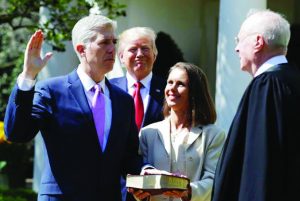by Dave Workman | Senior Editor

President Donald Trump watches as Supreme Court Justice Anthony Kennedy administers the judicial oath to Judge Neil Gorsuch during a re-enactment in the Rose Garden of the White House White House in Washington April 10. Holding the bible is Gorsuch’s wife Marie Louise Gorsuch. (AP Photo/Evan Vucci)
The successful confirmation of Judge Neil Gorsuch to the Supreme Court on a nearly straight-line party vote with three Democrats defecting to support the nomination both wounded and infuriated the gun prohibition lobby.
When he was sworn in as an associate justice during a White House ceremony, anti-gunners gritted their teeth.
Gorsuch was confirmed 54-45 one day after Republicans exercised the so-called “nuclear option” by cutting off debate and allowing confirmation on a simple majority vote. He was sworn in the following Monday by Associate Justice Anthony Kennedy, for whom Gorsuch once clerked.
The confirmation and swearing in amounted to a stinging defeat for anti-gun Democrat Senators Charles Schumer, the minority leader, and Dianne Feinstein. The rules are now changed for every future confirmation vote, and the Supreme Court balance has been restored so that it is less likely to see an “activist court” anytime in the future.
Alan Gottlieb, chairman of the Citizens Committee for the Right to keep and Bear Arms, said in a statement, “The court has been shy one critical vote and voice for more than a year. We are delighted that time has come to an end.”
Chris Cox, executive director of the National Rifle Association’s Institute for Legislative Action, congratulated Gorsuch on his confirmation, noting in a statement, “Gorsuch is an excellent choice to fill the vacancy left by the passing of Justice Scalia.”
While the mainstream press immediately reported the action as “a dramatic rule change that could deepen partisan divisions and put more ideologically extreme justices on the court,” that was not accurate.
The “nuclear option” was itself a departure from the tradition of confirmation by simple majority, essentially invented by Democrats in 2013 under former Sen. Harry Reid, the Nevada Democrat who was majority leader at the time. The latest vote on the rule change was split along party 52-48. Here is how the Washington Post reported it that year when Democrats took action to push through Barack Obama’s nominees:
“Democrats used a rare parliamentary move to change the rules so that federal judicial nominees and executive-office appointments can advance to confirmation votes by a simple majority of senators, rather than the 60-vote supermajority that has been the standard for nearly four decades.”
Schumer (D-NY) had led a filibuster effort to prevent the Gorsuch confirmation. He had argued that Gorsuch’s nomination should be withdrawn so the Senate could consider a nominee more acceptable to Democrats.
Texas Sen. John Cornyn, in remarks on the Senate floor following the vote, said, “It’s been a long journey back to the normal functioning of the United States Senate.”
He called the Democrats’ filibuster “pointless.”
The three Democrats who voted for Gorsuch were Sens. Heidi Heitkamp of North Dakota, Joe Donnelly of Indiana and Joe Manchin of West Virginia.
A recent Rasmussen survey found that nearly half of likely voters “believe opposition to President Trump’s first Supreme Court nominee is due mostly to partisan politics.”
With Gorsuch on the Supreme Court bench Second Amendment advocates can breathe a little easier, but only a little.
American gun owners cheered the Heller ruling nearly nine years ago because it affirmed that the Second Amendment delineates an individual right to keep and bear arms. That ruling, authored by the late Justice Antonin Scalia, whom Gorsuch is replacing, vindicated gun rights organizations that had argued vigorously for years against the so-called “collective interpretation” of the amendment as protective only of a state’s right to organize a militia.
Two years later, the McDonald ruling that nullified Chicago’s handgun ban and incorporated the Second Amendment to the states—a Second Amendment Foundation case—solidified the individual right interpretation. Changing the high court majority could easily jeopardize those rulings, and based on some lower federal court rulings, there still appear to be some judges who may not accept the Supreme Court’s wisdom.
President Donald Trump has the opportunity to level the lower court playing field. He’s got some 100 empty seats to fill by appointing judges.
Some media reported that the Gorsuch nomination which brings the court makeup back to the required nine judges may be more likely to take up some gun-related appeals sooner rather than rejecting such appeals as the high court has done with several recent cases.



